A few words of wisdom from a proper bastard.
Okay, time for some positivity. There’s (finally!) been the tiniest suggestion of spring in the air here in southern England. The evening’s are lighter. Time, perhaps, to be less angry for a change.
I’m frequently scathing about police management, to which my answer is simple - I’d shoot less if the target didn’t give me so much ammunition. Nonetheless, I often reference the fundamental importance of good managers and leaders (I’m not a management theory geek, so I’ll use the terms interchangeably). I’ve said it many times - being led properly, by people who know what they’re doing, is a privilege.
So today I’m going to discuss some examples of good leadership. Then, I’m going to tease out a few conclusions. Interested parties might use this not-very-scientific essay to contextualise their own leadership style. Or just enjoy a few dits that don’t involve me grumbling about guv’nors for a change.
I’m easy either way.
Although management isn’t my area of expertise by any stretch of the imagination, I’ve plenty of experience when it comes to being managed. I spent twenty-five years at the bottom of the police food chain. By the time I left, the bloke fixing the photocopier was more influential. So if I haven’t seen it all as far as good and bad leadership goes, I’ve seen most of it. Also, serving on the Met’s anticorruption unit, I saw how police officers of every rank can ‘catch a cold’. Incidentally, my bitter and twisted article on police promotion can be enjoyed here.
I’ve worked in a few risky areas of policing; I’ve seen managers under pressure at close quarters. Some thrive. Others buckle like an empty Coke can. Mind you, these qualities don’t necessarily map across into the pastoral elements of leadership. There are ruthless bastards who can solve serious crimes standing on their heads, but are awful when it comes to officer welfare. And vice versa. One who can do both? They exist. A few even pierce the blobby permafrost to achieve high rank.
Come back Gene Hunt, all is forgiven.
The first hurdle police leaders face (and good ones master) is this; although a ‘disciplined service’, a constable’s training emphasises operational independence. For example, technically, a constable cannot be ordered to arrest someone - that’s an individual’s prerogative, based on law, circumstance and discretion. Furthermore, our policing model was founded on officers patrolling alone and exercising their powers with relatively little supervision. This culture is strong. It runs deep.
This means, occasionally, managing police officers can be like herding a bunch of particularly bloody-minded cats. Coppers pretty much - although there are exceptions - know what they’re meant to be doing and prefer to be left alone to get on with it. Most coppers I know hate micromanagement. They do, however, appreciate management support when its needed.
I think, for some managers, that can come across as wanting to have your cake and eat it too. Getting this balance right, I suspect, is part of the key to successfully leading police officers. Of course, the challenge now is an inexperienced workforce led by relatively inexperienced sergeants. That’s possibly the service’s biggest problem (which can’t and won’t be solved by parachuting in direct-entry middle managers).
For me, this dichotomy between management diktat and operational autonomy lies at the heart of policing’s poor industrial relations. As soon as you hit the rank of chief inspector upwards (yes, of course this is a generalisation) many of us in the trenches suspect your job is to cast judgement on stuff (a) you don’t do anymore or (b) never really did in the first place.
Of course, this is heavily mitigated by the length of time a manager spent as a constable or sergeant. A superintendent making a wrathful Monday morning judgement over something an incident occurring over the weekend is likely to get more respect if they spent a significant amount of time as a constable.
It’s also why I’ll go to my grave thinking direct-entry superintendents are a sick joke invented by Theresa May because someone was rude to her at the Police Federation conference. I notice the scheme’s currently paused. I wonder why?
So here’s a pro tip to any flyers - most of us genuinely respect it when you go out on patrol or whatever it is your team does. A full shift, by the way, not a drive-by. There was once a newly-promoted superintendent on the accelerated promotion scheme who’d occasionally do a shift driving the station van. He would arrest people and work night duty. Some of the saltier or lazier bosses were not impressed. The constables and sergeants adored the bloke and would follow him off a cliff.
Why?
Because he was prepared to fight with drunks, risk complaints and sluice puke out of the back of the van. He put himself out; supers are very busy people in my experience, even if most of their work is bollocks invented by their bosses.
At this point I won’t name the detective superintendent who (allegedly) decided, after a particularly lily-livered gold group, to personally front out a foreign suspect up to no good on UK soil. He invited the suspect to attend the nearest airport and fuck off. Which the naughty fellow, knowing the game was up, did.
It reminded me of a sergeant-major I once met. The sign on his desk read LEAD, FOLLOW OR GET OUT OF THE WAY.
Quite.
A Chief Superintendent’s epaulette, featuring a crown and a Bath star. What are you going to do with your godlike powers?
So now to Sergeants. The most important rank in the police, and also the most thankless. At this point I’ll mention the Police and Criminal Evidence Act 1984 (PACE). Before you nod off, PACE places certain responsibilities on officers of a certain rank. One of the most onerous and risky is Code C, which deals with people in custody. By creating the role of Custody Sergeant, ultimately responsible for the wellbeing of every scrote dragged into a police station, we took a fairly complex job (line managing a bunch of coppers of variable quality) and made it even more complex. Some forces mitigate this by making custody a specialism, whereby sergeants do nothing else. When I was in uniform, they took turns.
Sergeants, by the way, don’t get paid a great deal more than their constables. They also have to shield their troops from the inspectors and above, usually by taking the blame when one of their constables fucks up. Conversely, if they let too much shit roll downhill, their constables might take umbrage and go-slow. One reasonably accomplished barrack room lawyer can make a sergeant’s life a genuine misery.
I did some maths in my head. In 25 years, across all roles, I must have worked for upwards for at least fifteen sergeants. Probably more. Poor bastards. The Met’s a vast merry-go-round, with lots of movement across all ranks. This taught me the following principle, summarised into the famous Old Sweat saying, 'You cant do enough for a good skipper’. Which translates into; this person is worth their weight in gold, it’s a harsh world out there, look after them at all costs.
Sergeant looks after troops. Troops look after sergeants. Capiche? This sounds so bloody obvious, but I can assure you it isn’t.
Yes, sergeants will have ‘problem children’ on their team who’ll take up an unfairly disproportionate amount of their bandwidth. One tactic is for the sergeant to make life easier for their competent officers - they’ll help the sergeant square up the floggers. Simple stuff like trying to fairly shuffle duties so people get the time off they need. Other welfare basics like being mindful of childcare, overtime, training courses and ‘has Pc Smith been standing on that scene cordon for sixteen hours?’ Getting those plates spinning in harmony is the key to small unit success. A good sergeant also makes sure his or her officers are getting the experience they need to (a) get better at coppering and (b) are moving their careers in the direction they want to go.
More basics, so easily missed.
In top-level bicycle racing they call this the ‘aggregation of marginal gains’ whereby every tiny detail is analysed for improvement. British Cycling’s coach Mike Brailsford famously said, “the whole principle came from the idea that if you broke down everything you could think of that goes into riding a bike, and then improve it by 1 percent, you will get a significant increase when you put them all together.”
I know this works because I’ve been led by outstanding sergeants who practiced the aggregation of marginal gains without even realising. I don’t know if it’s a personality type (I suspect it is) but the difference between them and the ones who can’t is stark.
You really cant do enough for a good skipper.
Of course, some sergeants are passing through because they’re in a hurry to become an inspector. The funny thing is, they can easily get promoted while still treating their constables like something they found on the bottom of their shoe. Looking after your troops involves disagreeing with the inspector now and then. It means taking the occasional risk and (gasp) sensibly reinterpreting bone-headed police regulations. These are not the qualities of which flyers are generally made.
When I was unwell (they ended up retiring me) I had several outstanding sergeants (and above, all the way up to superintendent level) who did everything they could - and more - to protect me from the Met’s robotic HR policies and welfare apparatus. They probably have no idea quite how much difference they made to my life, and for that I’ll always be grateful. Policing is a people business. If you aren’t a people-person, why the hell did you join?
Oh, and here’s a tip I once heard from a very sweaty sergeant; you really can’t do enough for a good inspector.
Want to be the best skipper you can be? For my money, Sgt. Esterhaus from Hill Street Blues should be your role model. If you’re under 50, Google him.
Inspectors are the other ‘operational’ rank. Constables, both detective and uniformed, will see them frequently. Although hopefully not too much - any half-decent inspector will spend a fair bit of time protecting his or her team from the Mount Vesuvius of bullshit coming from the SMT.
Inspectors, in my day, tended to come in three flavours. Fast-track, passing through and the-rank-they’ll-retire-in. As this is a generally positive post, let’s not dwell on the fast-track creatures.
The quality of the other two varies wildly. It often depends on their operational background; you would occasionally meet guv’nors who were piss-takers in the lower ranks and assumed everyone else was as bad as they were. This poacher turned gamekeeper could be the bane of your life. On the other hand, once they find out you aren’t (much of) a piss-taker they can be easy to work with. Those who slide into the rank of inspector towards the end of their service, usually in a transparently cynical bid to boost their pension, can be a hoot to work for. This is due to their blend of experience, lack of ambition and understanding the Job’s a cosmic joke of epic proportions.
Serving in small, specialist teams, I probably worked closer with my inspectors and chief inspectors than the average copper. One was especially good at listening to everyone’s ideas. Sometimes he’d agree, sometimes he wouldn’t. But he was never dismissive. He’d simply say, "My mind’s open, but at the end of the day the decision’s mine. I’d ask you to respect that.” The reason this worked was because he clearly wasn’t risk averse - quite the opposite. He was simply exercising his right to manage. He also knew the law and was a master of departmental politics. He was also confident enough to realise when he didn’t know something. A shrewd person, who understood the importance of an office lunch.
Oh, and he never made chief inspector.
Talking of which, I’m not going to say much about chief inspectors. I have a confession to make - even after a quarter of a century in the Job, I still didn’t really know what they did or how they fitted in. Chief Inspector isn’t even a PACE rank with its own responsibilities. Apart from SIOs, where the grade kind of makes sense (as a senior inspector), I’m still at a loss. Perhaps one or two can chime in and help me out.
Nonetheless, I’ve known some good ones on a personal level. And, of course, some utter bastards.
Then we get into the firmament of the superintending ranks and beyond. It stands to reason, as a detective constable, most of my experience was with sergeants (as line managers) and inspectors (as unit heads). However, sometimes I dealt with senior officers (up to and including Chief Constables). Some of our operations were super sneaky, sensitive, risky or all three. In my experience, if the brass are going to put a wet signature on a plan, they’ll want to meet the fucker who wrote it.
This is when you notice a different sort of management style and leadership come into play. The good ones know when to wave their magic wands and get stuff done. For example, there was a big counter-terrorist job in the mid-90s against PIRA. It was one of those operations which escalated very quickly. One minute there were a dozen officers realising shit just got real, then next the office was heaving with sixty people scrambling to observation posts and control rooms.
David Veness (now Sir David), then Assistant Commissioner Specialist Operations (ACSO) wandered into the office to see how things were going. He overheard a conversation between several DCs about IT issues. Veness sat down and quizzed the guys on the issue, which couldn’t be resolved by our own IT department quickly enough. Summoning one of the DIs, he said, “I’ve been talking to the DCs. What do you need?”
When told we were after a significant amount of kit, including a full suite of secure, networked laptops, he shrugged. “Go and buy whatever you need. Put it on the SO credit card.”
“When, Sir?”
“Now.”
The DI mentioned procurement protocols. Veness shook his head. “I’m sure the Commissioner will understand. Buy off-the-shelf if you have to.”
This might not sound a big deal now. Organisations are more agile. But in 1996? In the Met? This was like Moses telling the Red Sea to get out of the bloody way. Veness chose to put his ear to the ground and acted decisively. To hell with protocols. I saw other examples of Sir David’s old-fashioned, decent and resolute management style during my time in Specialist Operations. He is a gentleman and I salute him.
Sir David Veness, CBE, QPM. A copper and a gentleman.
Then there are senior leaders who combine an eye for detail with fairness. Some years ago, I reviewed the intelligence case against an officer accused of a corrupt relationship with their informant. Obviously, this is an area I’m obliged to be especially careful writing about. Nonetheless, I think the scrutiny the Met applies to this once-compromised area of policing should also be acknowledged. Is the Met occasionally opaque and arbitrary, given to covering its arse? Yes. That isn’t to say it isn’t also capable of getting things right. Get the right leaders and you’ll get the right outcomes.
Anyhow, I reviewed the case (there was loads of material to go through) and spoke with other interested agencies, some of whom took a view based on their own operating practices. I looked into the protagonist’s histories. It was as thorough a review as possible. The officer concerned had an excellent record. They had no history of dodginess. The officer was working in a risk-laden environment, at the top end of criminal intelligence. The informant was, it has to be said, deeply slippery. Without going into any further detail, I offered the view the relationship wasn’t corrupt. For the avoidance of doubt, if I thought the officer was a wrong ‘un, I’d have happily seen them charged and thrown in prison.
But I didn’t.
I met the Commander who would make the decision about a way forward - the Director of Covert Policing. He went through my work in forensic detail. He asked lots of well-informed questions, few of them easy. He was scrupulously fair. The easier decision, I think, would have been to have thrown the officer concerned under a bus. I suspect that’s what several partner agencies would have preferred. I’ve met senior officers who would have done exactly that.
Instead, the Commander cleared the officer. He also, I should add, was an extremely experienced detective who’d been around the block a few times. I’d work for him any day of the week.
Lastly, I think it’s only fair I mention senior Police Staff. One of my last postings was with the Met’s Intelligence Bureau. Senior leaders are sometimes lumbered with delivering bad news. The deputy director of intelligence was a senior member of Police Staff (I can’t remember her name, sadly, as she moved on shortly afterwards).
The Deputy Director held a meeting for a hundred-odd people. She explained, simply and honestly, the funding mess the Met was in (this was a couple of years after the 2012 austerity apocalypse). She held nothing back. She acknowledged the politics. Things would change and not necessarily in a good way. Police Staff colleagues are easier to sack than coppers, who are simply redeployed. When tackling the issue of redundancies, she was composed but clearly upset. She cared. When she said she’d do everything possible for colleagues ‘in scope’ you could tell she meant it.
In short, she treated her staff like adults. Were we happy? Not really. Did we empathise with her position? Absolutely. Did we feel like we were on the same side? Yes, more than police employees usually do. I walked away thinking it was the most honest, transparent thing I’d heard from a senior police leader for years.
Why is it some people achieve high rank and retain their humanity when so many others don’t?
I have my suspicions.
The King’s Police Medal. As Shania Twain famously sang, ‘that don’t impress me much.’
Now I’ve read and re-read this piece, I’m worried I’ve added anything truly original to the subject of leadership. I’m sure this stuff’s been said before, but given the state the Job finds itself in, there’s no harm in repeating it;
Looking after people is reciprocal, whatever your rank. Do it right and it’s a win-win.
Sometimes doing the right thing will involve pissing off your bosses. This is where moral courage gallops onto the field. Will you do the easy thing or the right thing? Be honest.
Karma. When you choose the easy thing (see above) those of us in the trenches are unlikely to forget. Nobody holds a grudge like a copper. If we get the chance to get even, we probably will.
Some people work to live. Some people live to work. Most of us fall somewhere in the middle. All of these decisions are valid.
Leadership is hard. There’s no shame in doing something else if it isn’t for you.
Believe it or not, most coppers want their bosses to succeed, if only for reasons of self-interest.
Crowns and Bath stars do not magically increase your intelligence. If you were a thick bastard when you were a sergeant, you’re probably a thick bastard of a superintendent. Understanding your limitations and surrounding yourself with clever people is the way forward.
We are all only human. Please, leave your ego at home before you head off for work.
If you can’t take a joke, you shouldn’t have joined. When I look at the DEI-indoctrinated, Cromwellian miserabilists who seem to make up the current NPCC cadre I want to weep.
One day you’ll no longer be a copper. People will remember what sort of person you were. Not your rank, your diversity initiatives or your King’s Police Medal.
You REALLY can’t do enough for a good [insert rank here]
Have a great week people, especially the awesome bosses out there fighting the good fight.
For newer readers, this Substack is free. If you want to support my writing, though, check out my Amazon author’s page. I write all sorts of stuff.
Cheers,
Dom

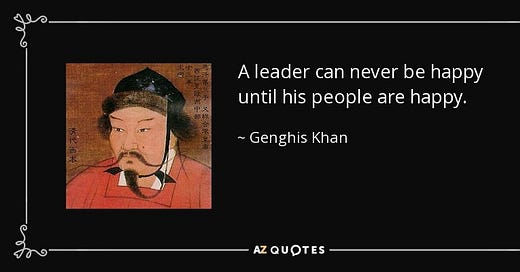



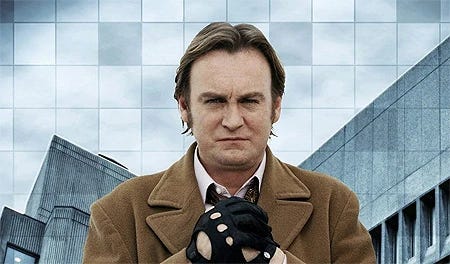
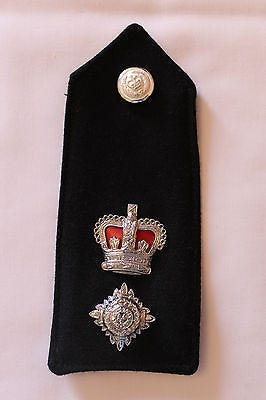
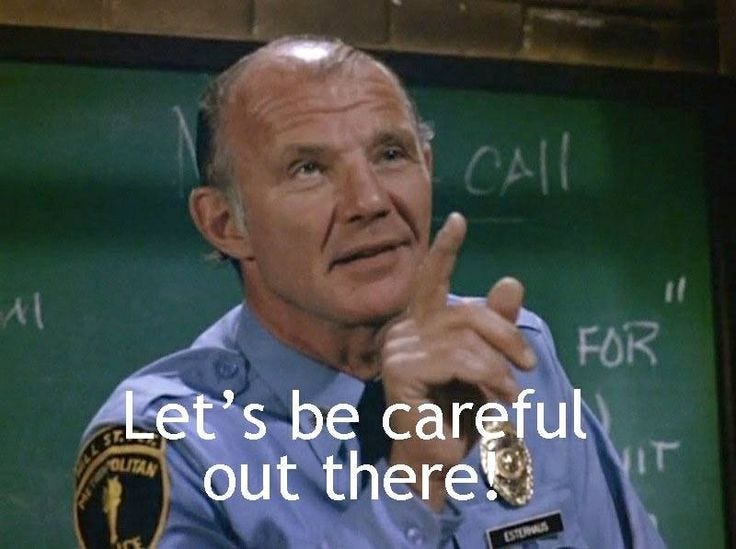

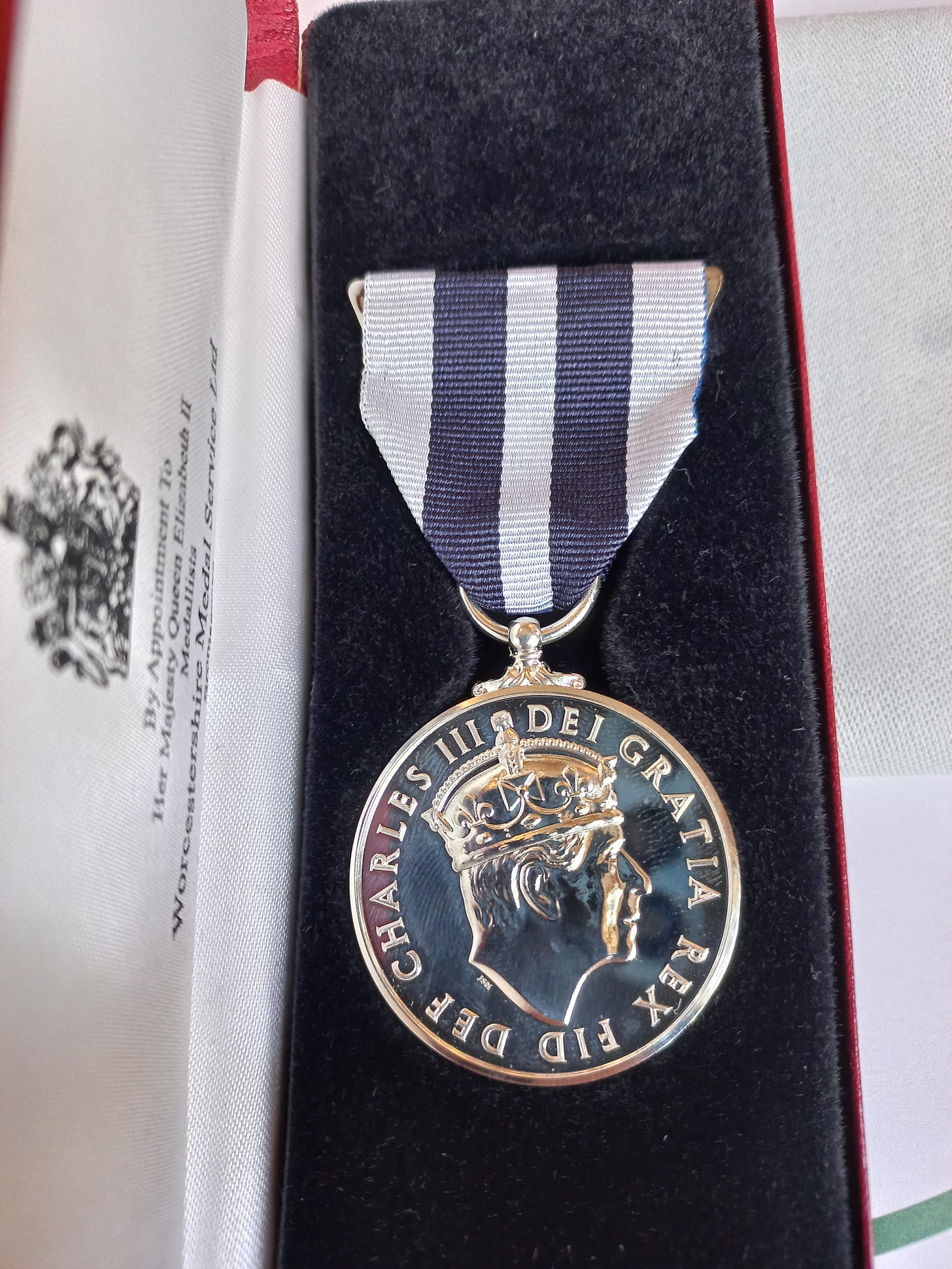
Your comments on Sir David ring true. I was on an exercise with SO13 and the military wing of the Conservative Party when Mr Venness (as he was then) arrived for a morale boosting visit. He made the mistake of asking me how it was going. I replied that the actions being passed to SB were laughable, and showed how much SO13 didn't know about the way we worked.
The following Monday I received a call from my Chief Super. "The AC wants to see you now. WTF have you done?"
After half an hour with Mr Venness, explaining the way I thought the exercise could be improved by some genuine SB input, I was given the task of writing the SB side of the next exercise (and several other afterwards as well) much to the annoyance of SO13.
Whenever our paths crossed after that, I was impressed that he always remembered my name. Not many managers that senior were capable of that.
I soon realised that Chief Inspector was my ceiling, having tried T/Supt I got fed up with endless, pointless meetings. My attitude was that my job as a CI, after I transferred to North East Scotland, was to make the life of the boys and girls on the front line as easy as possible. Make sure that had the kit they needed, filter out most of the crap that was flowing down from on high and show solidarity with them by doing late turns and 'hooli-patrols' on a Friday and Saturday night. If you treat the troops right they make you look good.